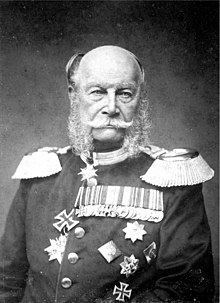Heinrich I of Liothidia: Difference between revisions
No edit summary |
No edit summary |
||
| Line 49: | Line 49: | ||
'''Henry I''', or in {{wp|German|Liothidian}}: '''''Heinrich I''''' (full name: ''Henry Albert Louis of Hechrenreyt'', Liothidian: ''Heinrich Albrecht Ludwig von Hechenreyt'', 10 October 1800 – 9 June 1885), of the [[House of Hechenreyt]], was King of Rahdenburg and Emperor of Liothidia from 1856 until his death in 1885. | '''Henry I''', or in {{wp|German|Liothidian}}: '''''Heinrich I''''' (full name: ''Henry Albert Louis of Hechrenreyt'', Liothidian: ''Heinrich Albrecht Ludwig von Hechenreyt'', 10 October 1800 – 9 June 1885), of the [[House of Hechenreyt]], was King of Rahdenburg and Emperor of Liothidia from 1856 until his death in 1885. | ||
From 1834 until 1858, Henry I would hold the title of Crown Prince of Rahdenburg (Kronprinz) and from 1846 until 1858, the title of Crown Prince of Liothidia, due to the lack of a male heir for his older brother, [[August-Wilhelm I]]. His younger years were dominated by a successful military career, which set him apart from his more intellectual brother, and following Liothidian unification, he worked alongside key figures to reform the Liothidian military. Upon his coronation as Emperor of Liothidia in 1858, following the death of his brother, he would further set himself apart from his predecessor with a more active role in politics, aggressive foreign policy and a successful patronage of industry. | |||
His reign as Emperor was marked by three major conflicts, dramatic territorial expansion and the establishment of Liothidia as major world power in the late 19th century. His reign also saw some improvements to political rights, but most successes under him are economic in nature, with his personal and official patronage of industry, leading to strident progress in the industrial revolution. Noted as often being cold, authoritarian and stern, many historians note that his personality had an immense influence over his grandson and future successor, [[Heinrich III]]. | |||
== Early life and military career == | == Early life and military career == | ||
Revision as of 01:22, 12 May 2019
| Henry I | |||||
|---|---|---|---|---|---|
 | |||||
| Liothidian Emperor (more...) | |||||
| Reign | 12 December 1858 - 9 June 1885 | ||||
| Coronation | 14 December 1858 | ||||
| Predecessor | August-Wilhelm I | ||||
| Successor | Heinrich II | ||||
| Minister-Presidents | See list | ||||
| King of Rahdenburg (more...) | |||||
| Reign | 12 December 1858 - 9 June 1885 | ||||
| Predecessor | August-Wilhelm I | ||||
| Successor | Heinrich II | ||||
| Lord Minister | |||||
| Born | 13 October 1800 Erbswalde Palace, Rixdorf, Kingdom of Rahdenburg | ||||
| Died | 9 June 1885 Franzburg Palace, Rixdorf, Liothidian Empire | ||||
| Spouse | Sophia-Victoria of Dannenburg (m. 1829) | ||||
| Issue | |||||
| |||||
| House | Hechenreyt | ||||
| Father | August-Friedrich III | ||||
| Mother | Margarete von Verrenhalle | ||||
| Religion | Fabrian Catholic | ||||
Henry I, or in Liothidian: Heinrich I (full name: Henry Albert Louis of Hechrenreyt, Liothidian: Heinrich Albrecht Ludwig von Hechenreyt, 10 October 1800 – 9 June 1885), of the House of Hechenreyt, was King of Rahdenburg and Emperor of Liothidia from 1856 until his death in 1885.
From 1834 until 1858, Henry I would hold the title of Crown Prince of Rahdenburg (Kronprinz) and from 1846 until 1858, the title of Crown Prince of Liothidia, due to the lack of a male heir for his older brother, August-Wilhelm I. His younger years were dominated by a successful military career, which set him apart from his more intellectual brother, and following Liothidian unification, he worked alongside key figures to reform the Liothidian military. Upon his coronation as Emperor of Liothidia in 1858, following the death of his brother, he would further set himself apart from his predecessor with a more active role in politics, aggressive foreign policy and a successful patronage of industry.
His reign as Emperor was marked by three major conflicts, dramatic territorial expansion and the establishment of Liothidia as major world power in the late 19th century. His reign also saw some improvements to political rights, but most successes under him are economic in nature, with his personal and official patronage of industry, leading to strident progress in the industrial revolution. Noted as often being cold, authoritarian and stern, many historians note that his personality had an immense influence over his grandson and future successor, Heinrich III.
Early life and military career
Crown Prince
Emperor of Liothidia
First Lio-Seredinian War
War of Hvornish Succession
Curator of Industry
War of Oseva
Later years and death
Titles, styles, honours and arms
Full title as Liothidian Emperor
His Imperial and Royal Majesty August-William the First, by the Grace of God, Emperor of Liothidia, King of Rahdenburg, Lord-Protector of Hvornum and Oseva and Supreme Prince of the Realm; Margrave of Harrenburg, Burgrave of Meiersberg, Count of Löwenkopf; Sovereign and Supreme Duke of Teringen and of the County of Nieden; Grand Duke of the Upper Schwarzwasser and of Demsten; Duke of Rüdesheim, of Levenkusen, of Subelia, of Jurena, Prenzlau, Hohenland and Blumenthal, of Lehnstedt, of Vechta, of Steffenshagen and Ribnitz; Landgrave of Falstein and Dranske; Margrave of Upper and Lower Lustia; Lord of Talheim, Rastede and Karschau; Master-General of the Imperial Armies, Faithful in Christ, Wise and Learned and Paramount Lord of the North.